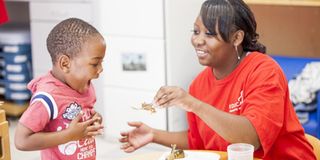Parents challenged to step up responsibility of nurturing

A mother enjoys a playful moment with her son. Parents with children in different age groups are advised to come up with a strategy that engages all the children.
PHOTO/net
What you need to know:
The first school in training a human being is at home. It involves teaching and imparting skills and values by parents or guardians. The second school is the community and the third one is the formal school.
Out of 20 randomly selected parents that we asked what their biggest challenge in the pandemic has been, 16 of them sighted school closure.
“What that means is that parents are incurring more expenses because children have to eat, utility bills are higher, and the children need constant caretakers. Some need homeschooling, and many other expenses – all in these financially trying times,” Christopher Mukasa, one of the parents explained.
As parents strain to address financial challenges, there is even a bigger challenge – parenting in a pandemic.
Actors convening at the Department of Child Health and Development at Makerere University College of Health Sciences, under the Parenting Agenda for Uganda, observed that although parenting has been a challenge to many mothers, fathers and caregivers in the past, the pandemic has not made it any better.
Challenges
Dr Godfrey Siu, a lecturer at the department and head of the Parenting Agenda, says according to the research they have conducted, family relationships were generally poor. “Relationships between husbands and wives are poor. For example, when a husband and wife fight, children are affected,” says Siu. Siu also says majority of fathers are absent in the home. “Fathers are working - which is a positive thing, but there is more to fatherhood than making money. Fatherhood is a responsibility, not a title,” Siu adds.
Speaking at the same convention, Fagil Mandy, an educationist, parent and keynote speaker, broke down the meaning of parenting. “We are not just talking about paying school fees, seeing dirty things and you shout, or just buying food at home –which some don’t even buy - we are talking about nurturing a child into a wholesome person with the input of both parents.
It also takes both parents to nurture a child. Yes, everybody is looking for money but you must make time for the most essential activities and parenting is one of those,” Mandy explains.
Dr Herbert Muyinda, the chair at the Department of Child Health and Development noted that parents have limited knowledge about the actual needs of children. While he mentions food, protection, love, safety and good health, he also adds that child development incorporates many aspects including biological, economic, cultural, and spiritual, among other dimensions of life.
“According to the study we have just concluded, more than 70 per cent of parents have challenges providing these needs,” Muyinda noted.
The biggest challenge to parents, however, is lack of skills on how to engage their children - they do not know what to do. “Many parents lack cognitive skills such as play – which children need.
For parents that have children in different age groups; adolescents, toddlers and babies, many do not know how to come up with a strategy that engages all the children. Some parents think being tough and violent is the way to discipline a child,” Muyinda explains.
Sharing their experience at the Ministry of Gender, Labour and Social Development, Juliana Naumo Akoryo, the Acting Director of the Department of Culture and Family, says parents who neglect children has resulted in teenage pregnancies and molestation of children at household level.
What parents need to do
Fagil Mandy explains that challenges that have manifested as a result of school closure is evidence that parents believe that education takes place only at the formal school.
“Education means the development of the brain so that it can reason, function, think and solve problems, plus educating the attitudes, mindset and training the body and skilling. This takes place in three schools,” he says.
According to Mandy, the first school in training a human being is at home. “Not homeschooling, but teaching and imparting skills and values by parents or guardians. The second school is the community. That is why parents say: “if you don’t listen to me, the world will teach you.”
The third one is the formal school- which includes nursery, primary, secondary, university or tertiary education. The three schools must work together to make a child a complete human being,” Mandy explains.
Mandy challenges parents to step up to their responsibility of being the primary teachers and not to relinquish their role to the formal school.
He is also alive to the reality that some parents are not equipped with skills to do this and suggests training of parents to foster proper parenting.
Prioritise parenting
To busy parents, Naumo urges parents to strike a balance between work and family.
“It is important that you prioritise your family. First by providing basic needs and after work, make time for your children.
Talk to them, play with them, take a walk with them, do housework together, read books with them. As much as you have to perform at your workplace, parenting is not a responsibility you can delegate. Invest in having a meaningful relationship with your children,” Naumo.
Dr Muyinda encourages parents to ensure safety of their children as well as create an environment that helps children to develop mentally and physically.




